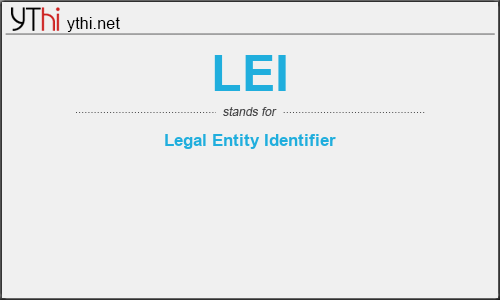What does LEI mean? What is the full form of LEI?
The Full Form of LEI is Legal Entity Identifier.
he legal entity identifier (LEI) is a reference code — like a bar code — used across markets and jurisdictions to uniquely identify a legally distinct entity that engages in a financial transaction. The LEI is designed to be a linchpin for financial data — the first global and unique entity identifier enabling risk managers and regulators to identify parties to financial transactions instantly and precisely. A large international bank, for example, may have an LEI identifying the parent entity plus a LEI for each of its legal entities that buy or sell stocks, bonds, swaps, or engage in other financial market transactions.
Why do we need the LEI?
When Lehman Brothers collapsed in 2008, regulators and private sector managers were unable to assess quickly and fully the extent of market participants’ exposure to Lehman and how the vast network of market participants were connected to one another. The financial crisis underscored the need for a global system to identify financial connections so regulators and firms can better understand the true nature of risk exposures across the financial system.
The establishment of the global LEI system is a significant achievement that responds to these vulnerabilities and provides meaningful long-term benefits for the public and private sectors.
The financial industry’s adoption of the global LEI means data reported externally to supervisors and used internally for risk management purposes will be more consistent and usable. The global LEI helps regulators better monitor and analyze threats to financial stability. It also helps companies improve their internal management of operational risks and reduce costs in collecting, cleaning, and aggregating data, and in reporting data to regulators.
LEI
means
Legal Entity Identifier![]()
Translate Legal Entity Identifier to other language.


Leave a Reply
You must be logged in to post a comment.